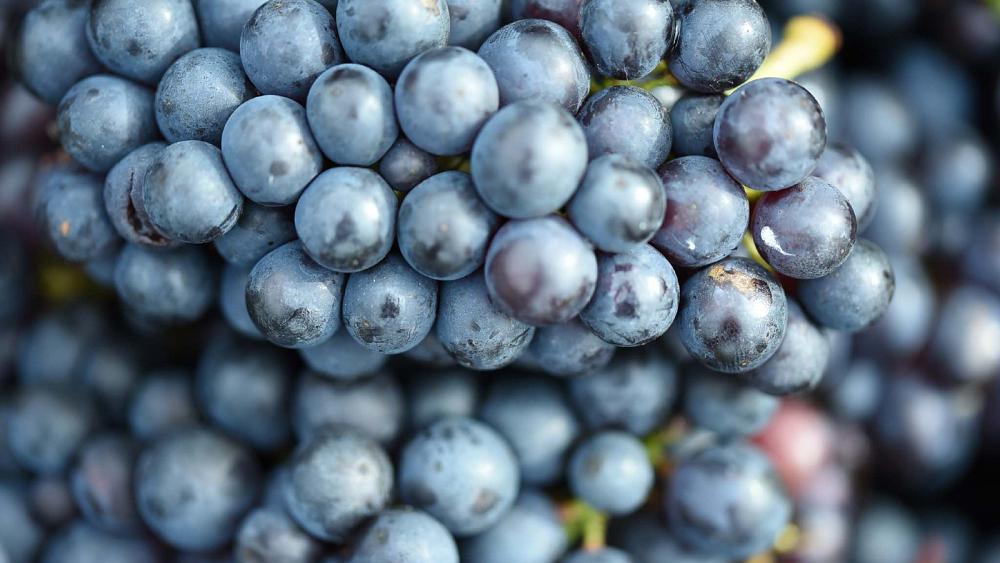
It wasn’t just the wettest summer in decades and biting spring frosts that England’s burgeoning sparkling wine industry had to deal with this year.
Brexit has also cast a long shadow, whether it’s labour shortages, missing shipments or bureaucratic headaches.
The lack of staff has hit hard: winemakers say for the first time they have struggled to find enough pickers for harvest.
Compounded by COVID restrictions, Brexit has led to a “sizable” reduction in the number of migrant labourers coming to England to pick grapes, according to Julia Trustram Eve, head of marketing at trade association WineGB.
“It was the perfect storm,” she said. “Inevitably, an awful lot of migrant workers went back because of COVID, but they didn’t return.”
‘An absolute nightmare’
Dermot Sugrue, a winemaker from West Sussex in southern England and credited with putting English sparkling wine on the map, agrees.
“Brexit is arguably the biggest crisis this industry has faced,” he told Euronews. “We simply cannot get the volume of people here to do the work. It’s an absolute nightmare.”
Using the traditional Champagne method, where grapes are harvested by hand, Sugrue requires huge amounts of labour in a very short space of time. Mechanisation is not possible.
These issues are hurting what is a recent success story of British industry.
Over the past five years, almost six million vines have been planted in southern England — enough to produce 18 million bottles — and it has created thousands of much-needed skilled jobs in rural areas, particularly in management, sales and marketing.
Exports of British wine doubled in 2019 to 550,000 bottles. Brexit permitting, WineGB expects exports to account for 30-40% of the total wine produced in Britain by 2040, bringing in some £350 million per year.
‘Everybody became creative’
But questions remain over winemakers finding staff to pick the vines. Even with migrant workers not returning because of Brexit and COVID, locals have failed to be a reliable option.
One leading supplier of vineyard staff, who wished to remain anonymous, described how in anticipation of labour shortages they advertised for British nationals to replace their usually Romanian workforce.
Of the 50 people who responded, only 20 returned the necessary paperwork to begin working. When harvest arrived, just five of these individuals showed up. Only one finished the harvest, a 60-year-old woman.
“Apparently skilled and productive people don’t exist in the UK,” the supplier said.
Without workers, British winemakers have had to experiment. Many set up schemes where wine enthusiasts could come and pick grapes voluntarily, often scheduling it around work or dropping the children off at school.
“All we had to do was give them a very good lunch, a bottle of wine at the end of the day, and pray it does not rain,” said Sugrue, who managed to mobilise nearly 100 volunteers.
Despite having lower expectations, he found the scheme “surprisingly efficient and cheap”.
“Brexit has made us realise we have to do something else,” said Sugrue. “We cannot rely on this foreign labour force as we have done for the last 15 years.”
As a relatively new industry, British winemakers rely on EU countries, particularly France and Italy, to supply their equipment. Corks, bottles, glasses, stillages, capsules – all must arrive at tight deadlines, as wine production is very linear. Missing even relatively minor inputs can set off chain reactions that halt production.
“The crazy paperwork involved in transporting goods after Brexit is delaying everything, making it more expensive, and creating a whole world of bureaucracy,” said Sugrue.
Wine GB estimates this new red tape will add up to £5 on the cost of a bottle of English sparkling when it is sold in the EU, making it harder to compete with more established brands.
Alongside these additional costs, winemakers faced greater stress.
“It is so demoralising,” said Sugrue. “We are working really hard to produce a quality British product that is celebrated on the world stage. Now we are crippled at every opportunity.”
‘We knew what was coming’
Other winemakers planned ahead. “I don’t want to sound blunt,” said Bob Lindo from the award-winning vineyard, Camel Valley. “But we are not stupid, we bulk-bought everything we needed in advance.”
Still, there were issues.
Following Brexit, Camel Valley — based in Cornwall, south-west England — stopped exporting to Europe, unless customers arranged their own collection.
“It’s just not worth it,” said Lindo. “Hauliers do not want to get involved with cumbersome and tricky new procedures.”
While the biggest markets for British wine lie outside the bloc, trading difficulties with the EU have complicated exports to non-EU destinations, particularly the US and Asia, since they were transported via hubs in France and Germany.
Another problem is sending samples to international competitions. Lindo recalled how one of his wines was returned by customs four times, leading him to abandon the idea. It has an obvious impact on the chances of British wines enjoying success on the international stage, where it has beaten French competitors in blind tastings.
But there were rays of light. Fuelled by the pandemic and rise of staycations, tourism is a rapidly growing part of the industry. Located in Cornwall, a scenic British holiday destination, Camel Valley saw bookings for its tours, tastings and dining experiences rocket.
“A funny thing happened,” said Lindo. “Hospitality went berserk after the lockdown and demand is now off the scale. This more than compensated, there’s no doubt about it.”
Given the experience of other established wine regions, WineGB predicts wine tourism in Britain could generate additional revenue of £658m per annum by 2040.
While Lindo opposed Brexit, he is optimistic for the future of British wine.
“Nothing can compensate for us leaving the EU, but people are agile,” he added. “They make do.”
Related posts:
Views: 0
 RSS Feed
RSS Feed

















 December 29th, 2021
December 29th, 2021  Awake Goy
Awake Goy  Posted in
Posted in  Tags:
Tags: 
















